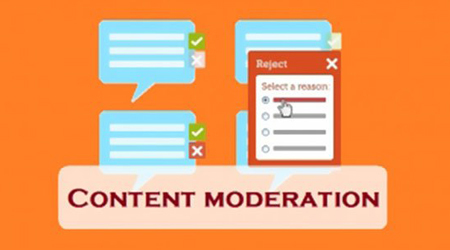Things About Social Media Content Moderation You May Not Have Known
 By Anolytics | 20 April, 2022 in Content Moderation | 4 mins read
By Anolytics | 20 April, 2022 in Content Moderation | 4 mins read

Making and enforcing rules on what may (and cannot) be posted on social media platforms is everything from impartial is content moderation or social media content moderation.
Public worries over content filtering have suddenly escalated, even though this type of governance has long been hidden in the shadows. Despite early enthusiasm for its participatory potential, social media is no longer seen as an empty shelf to be filled with anything or any content we choose. What we are permitted to place on that shelf is determined by value-laden, usually opaque judgments made by social media firms and companies.
User-Generated Content- Heart of Social Media Platform
Any social media platform relies on a thriving online community or user-generated content. Users generally build these groups independently, but social media platforms may help by offering services like user-generated content moderation or social media content moderation that make the content easy to use and share. Some have even grown to be more influential than their parent organizations, such as Reddit and Wikipedia (some people believe these actual search engines).
Good Moderator Means Being Responsive to Community
When it comes to social media content moderation, the essential thing to remember is to be sensitive. Content moderation companies must ensure that someone is present and on duty to react to allegations of rule-breaking behavior.
Suppose a rule-breaker realizes that they can do anything they want without consequence. In that case, they will take advantage of this fact and continue to disobey the rules, lowering the morale of your community.
In content moderation companies, a moderator should also be proactive: don’t wait for reports of rule violations to come in before acting; if you know the rules well and are familiar with the community’s standards (which you will rapidly learn), you can predict when someone is likely to breach them and act appropriately.
In social media content moderation, you should also pay attention to your community: whether through private messages, comments on articles, or another technique, learn what types of behavior irritate them and take action appropriately.
Ascertain that members realize that their input is valued; if necessary, make modifications depending on what members have expressed a desire for from their moderators. Everyone must keep the community working well for it to remain united!
Multiple Roles Within the Community Moderation Team
The job of community moderation isn’t the only one that contributes to the safety of Discord. Product management, developers, designers, analysts, the legal team, different levels of control, and senior leadership all contribute to making Discord a safe and enjoyable place to be. Other businesses, such as Riot Games, have their community moderating staff.
Content moderation services are also used by businesses worldwide to help monitor their user-generated content and communities. These businesses include social networking platforms, e-commerce sites, gaming platforms, etc. They may also utilize user-generated content moderation to manage other sorts of community material, such as photographs and videos and text-based messages and comments. Some even use content moderation companies like Anolytics. Ai, Cogito Tech for large-scale data analysis and moderation operations.
Different Guidelines for Content Moderation Than Traditional Websites
It’s worth noting that social networks aren’t always confined to the internet. Even if your community is gathering offline for the first time, you should enforce online regulations while promoting your website at a convention or trade event.
Understanding what is acceptable in your community is essential for monitoring social media content moderation in person and online. Moderators can also aid in the enforcement of these regulations by maintaining open lines of contact with the community and participating actively in it.
If you own a social networking site, double-check that you’ve covered all of your legal bases. Because copyright concerns (among others) may quickly escalate on a busy social networking site, it’s critical to have clear, standard protocols in place.
A Moderator Isn’t An Admin, But it’s Essential to Have a Good Relationship With Both
As a content moderator, you’re responsible for maintaining the site’s textual and aesthetic integrity. You’ll be making editorial choices on handling comments, whether a user should be banned from the site, and what kind of punishment is suitable for a violation.
Your responsibility is to ensure that the community adheres to the rules and that all users are treated equally.
Familiarities With Social Media Policies and The Legalities
Like being a good teacher, being a competent user-generated content moderator necessitates a thorough grasp of the law. Moderators must be knowledgeable about social media regulations and the legalities of monitoring material.
Many individuals believe that when it comes to content moderation, a company should permanently remove something unless it has the legal authority to preserve it. This isn’t always the case, though: sometimes the question isn’t whether you have permission to keep the information up but whether you have permission to remove it.
The key is how user data was gathered and what “permission” people gave for it to be used. If Facebook or another site obtained your information from publicly available sources (such as a user profile), Facebook might use that information to serve advertisements to you. Users must express their explicit agreement for sensitive data (e.g., date of birth or medical conditions) to be used by advertisers or anyone who have access to this information through Facebook’s advertising API if a site gathers it (Application Programming Interface).
A clever moderator must be aware of these distinctions or risk-making judgments based on stale information about what constitutes proper usage under Facebook’s Terms of Service.
Content moderation is Challenging Than You Might Think
Social media content moderation isn’t simply about deleting harmful content, as it turns out. It’s a human profession with significant ramifications for the future of technology, and the task can be more complex than many people imagine.
please contact our expert.
Talk to an Expert →
You might be interested

- Content Moderation 23 Jun, 2021
Why Social Media Content Moderation is Vital for Businesses
Freedom of speech typically allows social media users to express their views on anyone and any possible topic without th
Read More →
- Content Moderation 21 Apr, 2023
Social Media Content Moderation: Protect Influencer’s Reputation and Increase Reach
We live in the digital era and have become increasingly dependent on social media for communication. There is a large nu
Read More →
- Content Moderation 10 Jan, 2024
User Generated Content Moderation: Challenges of Human Moderation
User Generated Content (UGC) means any kind of media (photos, videos, comments, and product reviews) that is generated b
Read More →